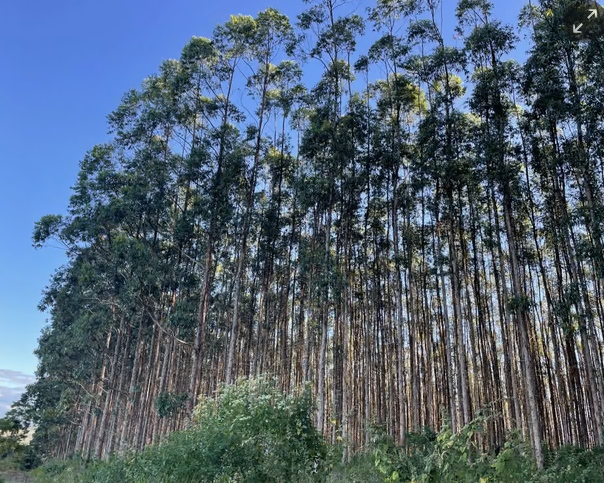
Trump Admin creative tactics to fight climate change, despite themselves.
See? It matters how news is contextualized.
Brazilian farmers were sure a Swedish-Finnish multinational was planting eucalyptus trees on public land. And they were right:
Surrounded by nearly 100,000 hectares (247,000 acres) of eucalyptus plantations, Baixa Verde is a rare example of a local victory over a multinational in Brazil. The rural settlement owes its existence to nearly two decades of legal battles over land rights – but the fight is not over yet.
After fighting to retain their land, the families now face an unprecedented security crisis marked by armed clashes, arson and death threats, part of a wave of violence driven by a land dispute that has escalated since 2024.
Conflicts over land rights have long been an issue in the region. Obtaining property titles is commonly deemed to legitimise land grabs from traditional communities, and local people had suspected that Veracel Celulose – a pulp-production company jointly owned by the Swedish-Finnish company Stora Enso and the giant Brazilian pulp manufacturer Suzano – was planting eucalyptus trees on public land.
In 2008, Ercilio Souza, one of the founders of the Baixa Verde settlement, and Juenildo Oliveira Farias visited government archives to review public documents. They found the page that proved the 1,300 hectares in dispute were owned by the government. “We always knew that it was public land,” says Souza.
With the document in hand, they assembled 91 local families and joined the Fight for Land Movement (MLT), a political and social organisation fighting for agrarian reform. Its first action was to occupy an area of a eucalyptus plantation used by Veracel, accusing the company of using public land.
Stories like this one may quickly disappear but we should give them more credence, if not prominence (attaboy, Guardian). Rather than the binary – this is great/that is awful –take some time to unpack a story and understand its complexities as a throughway, as appropriate. Be critical. Withhold the benefit of the doubt until it is deserved.
Also, wtf, Swedish-Finnish conglomerate, get your act together.
Image: A eucalyptus plantation in Baixa Verde owned by Veracel Celulose. Photograph: Sara Van Horn (Guardian)

 D.I.Y. is everywhere – look at this blog you’re reading, the e-book you could be reading there to the right. All of this is good, but it’s easy to be just a wasteful as large corporations, only on a small scale. But independent retailers can make being green part of their business plan from the get-go. A reader sends this
D.I.Y. is everywhere – look at this blog you’re reading, the e-book you could be reading there to the right. All of this is good, but it’s easy to be just a wasteful as large corporations, only on a small scale. But independent retailers can make being green part of their business plan from the get-go. A reader sends this